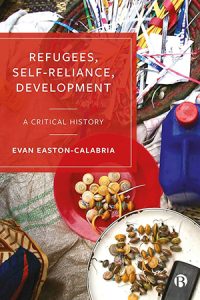Refugees, Self-Reliance, Development: A Critical History

Author: Evan Easton-Calabria
Publisher: Bristol University Press
Year of Publication: 2022
Print Length: 240 pages
Genre: Non-Fiction / History, Migration & Refugee Studies, Development Studies
Area: East Africa, Egypt, Greece, Kampala & Uganda, Pakistan, Tanzania
Topic: Refugees & Forced Migration, Refugees’ Roles & Self-Reliance; Self-Determination, Autonomy, Agency; Refugee-Led Organisations & Networks, Refugee Livelihoods, Refugee Economies, Refugee Management/Governance, Responses to Refugees, Cold War & Post-Cold War, Development, Digital Work & Platform, Economy, The Right to Work, Good/Best Practice, History, Archive, Motivation, Dignity, Policy & Practice, Politics & Power, Protection, Socialism, War, Civil War
The promotion of refugee self-reliance is evident today, yet its history remains largely unexplored, with good practices and longstanding issues often missed. Through archival and contemporary evidence, this book documents a century of little-known efforts to foster refugee self-reliance, including the economic, political, and social motives driving this assistance.
With five case studies from Greece, Tanzania, Pakistan, Uganda, and Egypt, the book tracks refugee self-reliance as a malleable concept used to pursue ulterior interests. It reshapes understandings of refugee self-reliance and delivers important messages for contemporary policy making.
The first chapter is available Open Access under CC-BY-NC-ND licence.
“In this excellent book, Evan Easton-Calabria shows that refugee self-reliance has a century-long and deeply political history. Drawing upon exemplary archival research, she unveils the array of external interests and power relations that have shaped livelihoods programmes for displaced people. This is essential reading for anyone concerned to think critically and constructively about the past, present, and future of refugee policy.” Alexander Betts, University of Oxford
“Two things stand out about this book: the clear, jargon-free language, and the historical insights into the widely promoted humanitarian goal of self-reliance with its focus on earning income. Evan brings a critical but fair perspective, and a wealth of experience.” Karen Jacobsen, Tufts University
Table of Contents
List of Figures and Tables
Abbreviations and Acronyms
Notes on the Author
Acknowledgements
1. Introduction: Why Refugee Self-Reliance?
2. Self-Sufficiency out of Necessity: Refugee Self-Reliance Assistance in Interwar Greece
3. Socialism and Self-Reliance: Refugee Self-Reliance Assistance in Post-Colonial East Africa
4. Warriors of Self-Reliance: Refugee Self-Reliance Assistance in Cold War Pakistan
5. Dignity in Informality? Urban refugee self-reliance assistance in Kampala, Uganda
6. Livelihoods 2.0? Refugee Self-Reliance and the Digital Gig Economy
7. Conclusion
Annex: A Note on Methods and Sources
References
Index

Evan Easton-Calabria is a research associate at the Refugee Studies Centre and a senior researcher at the Feinstein International Center, Tufts University. Previously she was Principal Investigator of the RSC research project, ‘Responses to Crisis Migration in Uganda and Ethiopia: Researching the role of local actors in secondary cities’, funded through the Cities Alliance/UNOPS, and a John Fell Fund grant, ‘Digital Livelihoods for Refugees? Exploring pathways to the new world of work in Nairobi and Tel Aviv’. She is also lead editor of the Refugee Studies Centre’s research dissemination platform Rethinking Refuge. Prior to this she worked on the Refugee Economies Programme’s research project on refugee-led social protection. Her work with refugees began in Kampala, Uganda, in 2011 and has led her to research historical and contemporary refugee self-reliance assistance and refugees’ involvement with development since the 1920s. In 2015 she was Principle Investigator for the National Geographic Early Career Grant project ‘Innovation and the Art of Self-Reliance: Artistic Livelihoods of Kampalan Refugees’ and in 2015-2016 for the research project ‘Researching Refugee-Run Micro-Finance’ funded by the Humanitarian Innovation Fund. While living in Uganda, she co-founded a grassroots organisation with refugees in Kampala that provides livelihoods training and support to urban refugees. She holds a Masters and Doctorate in International Development from the University of Oxford.
Source: https://www.rsc.ox.ac.uk/people/evan-easton-calabria
More from Evan Easton-Calabria in this library, click here.
